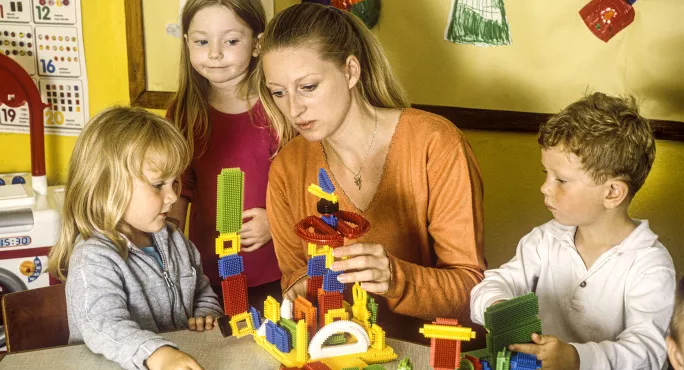
How plans for multi-school heads could sideline early years

Let me transport you to an alternative universe - I’ll call it Utopia.
Several local education authorities in Utopia have been thinking of bringing together a secondary school, its primary feeders and related early years settings under the leadership of a single headteacher.
There will be lots of depute heads to oversee the educational needs of children at different ages, between three and 18, but only one headteacher, providing overall strategic direction.
This uber-headteacher will, of course, be an early years specialist. She (early years specialists are usually “she”) will be assisted by a management team to deal with finance, staffing and other bureaucratic aspects of the job. But in terms of educational leadership, Utopians believe firmly in “putting the learner at the centre”, and everyone agrees that early years specialists have huge expertise in this respect.
- Background: The end of the primary head?
- Quick read: Teachers strongly oppose ‘executive heads’ plan
- Related: Primary leaders’ body hits out at executive head plans
- Analysis: Can one headteacher run eight schools?
This is because every single Utopian knows all about developmental neuroscience, attachment, the science of play and the potentially devastating consequences of adverse childhood experiences (ACEs).
They know that children’s success in school depends, to a remarkable extent, on what happens before the age of eight. If, during this formative period, children are supported in building strong foundations for lifelong learning and wellbeing, they will, from the very start, be confident individuals, successful learners, responsible citizens and effective contributors - as per the four “capacities” that Curriculum for Excellence aspires to. So schools in Utopia are happy, smooth-running places, where every learner is able to reach their full potential.
It’s not surprising that the early years specialists who help Utopian children realise their ambitions are extremely highly respected within the educational profession and that their settings are wonderfully well resourced. After all, the success of the whole educational enterprise depends on what happens to children during their most formative years.
Down to earth
Of course, the Utopians soon decided not to go ahead with the model because it was clearly daft. Everyone agreed that even a brilliant, multi-tasking, eyes-in-the-back-of-her-head early years specialist would have trouble overseeing the learning of such a wide and diverse age range.
But, sadly, back here in 21st century Scotland, it’s still under serious consideration (see the Tes Scotland long-read investigation of 27 April on what some are calling “executive headteachers”).
Here, it is automatically assumed that the headteacher must be a secondary specialist. How could anyone dream of anything else? Curriculum for Excellence may cover education from age three to 18 and it may, on paper, look like a developmentally informed model, but, in practice, Scottish education still works on the same hierarchical, top-down principles that have informed it for longer than anyone can remember.
Until the Muir report was published two months ago, early years has scarcely ever been mentioned in official reports and reviews of education, and there are seldom any early years experts on official advisory bodies, such as the Scottish government’s International Council of Education Advisers.
Early learning and care (ELC) wasn’t even part of our funded state system until a year ago and ELC practitioners are the least well qualified and respected members of the educational hierarchy - they are appallingly badly paid.
Yet, over the past few years, there’s been growing recognition in Scottish schools that emotional wellbeing is vital if children and young people are to thrive educationally. Teachers are increasingly ACE aware and trauma informed. So perhaps, in response to Ken Muir’s plea for a national conversation about “putting the learner at the centre”, these teachers are ready to accept that what happens in early years has huge significance for their pupils’ long-term emotional wellbeing, self-regulation and resilience.
Perhaps they’ll be interested in listening to the growing band of highly qualified early years specialists in Scotland, who know far more about developmental neuroscience, attachment, the science of play and ACEs than most people at the top of the educational hierarchy.
Perhaps the result of the Muir review won’t just be a case of rearranging deckchairs and inventing new logos for Education Scotland and the Scottish Qualifications Authority.
There’ll never be a Utopia, of course, but Scotland could aim for an educational system in which top-down control isn’t the default model and there is greater trust and investment in the expertise of practitioners, including those who work with children in the first, most formative stage of their educational journey.
Sue Palmer is a former primary headteacher, an author and the chair of Upstart Scotland. She tweets @UpstartScot
You need a Tes subscription to read this article
Subscribe now to read this article and get other subscriber-only content:
- Unlimited access to all Tes magazine content
- Exclusive subscriber-only stories
- Award-winning email newsletters
- Unlimited access to all Tes magazine content
- Exclusive subscriber-only stories
- Award-winning email newsletters
You need a subscription to read this article
Subscribe now to read this article and get other subscriber-only content, including:
- Unlimited access to all Tes magazine content
- Exclusive subscriber-only stories
- Award-winning email newsletters
- Unlimited access to all Tes magazine content
- Exclusive subscriber-only stories
- Award-winning email newsletters
topics in this article



